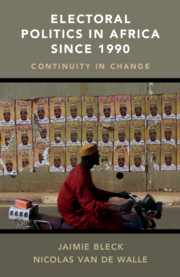Crossref Citations
This Book has been
cited by the following publications. This list is generated based on data provided by Crossref.
van de Walle, Nicolas
2018.
The Party Paradox: a Comment Nicolas van de Walle (Cornell) February 20, 2018.
Democratization,
Vol. 25,
Issue. 6,
p.
1052.
Sanches, Edalina Rodrigues
and
Macuane, José Jaime
2019.
Elections as Vehicles for Change? Explaining different outcomes of democratic performance and government alternation in Africa1.
Cadernos de Estudos Africanos,
p.
15.
Cheeseman, Nic
Kanyinga, Karuti
Lynch, Gabrielle
Ruteere, Mutuma
and
Willis, Justin
2019.
Kenya’s 2017 elections: winner-takes-all politics as usual?.
Journal of Eastern African Studies,
Vol. 13,
Issue. 2,
p.
215.
Paget, Dan
2019.
The Rally-Intensive Campaign: A Distinct Form of Electioneering in Sub-Saharan Africa and Beyond.
The International Journal of Press/Politics,
Vol. 24,
Issue. 4,
p.
444.
Brossier, Marie
2019.
Imaginaires et pratiques de la famille et du politique en Afrique : sortir du tout néopatrimonial par un dialogue « indiscipliné ».
Cahiers d'études africaines,
p.
323.
Pereira, José Santana
Nina, Susana Rogeiro
and
Delgado, Danielton
2019.
Elections in Cape Verde, 1991-2016: Testing the second-order election model in a consolidated semi-presidential African democracy1.
Cadernos de Estudos Africanos,
p.
67.
Shenga, Carlos
and
Pereira, Amílcar
2019.
The Effect of Electoral Violence on Electoral Participation in Africa.
Cadernos de Estudos Africanos,
p.
145.
M., Moniruzzaman
2019.
Elections - A Global Perspective.
Sanches, Edalina Rodrigues
Macuane, José Jaime
and
Dendere, Chipo
2019.
Introduction.
Cadernos de Estudos Africanos,
p.
9.
Hassan, Mai
2020.
Regime Threats and State Solutions.
Saidou, Abdoul Karim
2020.
L’après-Compaoré au « concret » : transition politique et réformes des politiques de sécurité au Burkina Faso.
Politique et Sociétés,
Vol. 39,
Issue. 2,
p.
81.
Ferree, Karen E.
Gibson, Clark C.
and
Long, James
2020.
Mixed Records, Cognitive Complexity, and Ethnic Voting in African Elections.
SSRN Electronic Journal ,
Meng, Anne
2020.
Constraining Dictatorship.
Pailey, Robtel Neajai
and
Harris, David
2020.
“We don’t know who be who”: post-party politics, forum shopping and Liberia’s 2017 elections.
Democratization,
Vol. 27,
Issue. 5,
p.
758.
Sjögren, Anders
2021.
Engaging with elections: Ethno-regional mobilization, demands for federalism, and electoral politics in central Uganda.
Regional & Federal Studies,
Vol. 31,
Issue. 5,
p.
577.
Harding, Robin
and
Michelitch, Kristin
2021.
Candidate coethnicity, rural/urban divides, and partisanship in Africa.
Party Politics,
Vol. 27,
Issue. 4,
p.
791.
Tkach, Oleg
and
Tkach, Anatoly
2021.
FEATURES OF AUTHORITARIAN DEMOCRATIZATION IN THE CONTEXT OF GLOBALIZATION.
Politology bulletin,
p.
241.
Choi, Hyun Jin
and
Raleigh, Clionadh
2021.
The geography of regime support and political violence.
Democratization,
Vol. 28,
Issue. 6,
p.
1095.
Siachiwena, Hangala
2021.
A silent revolution. Zambia’s 2021 General Election.
Journal of African Elections,
Vol. 20,
Issue. 2,
p.
32.
Rakner, Lise
2021.
Don’t Touch My Constitution! Civil Society Resistance to Democratic Backsliding in Africa´s Pluralist Regimes.
Global Policy,
Vol. 12,
Issue. S5,
p.
95.





